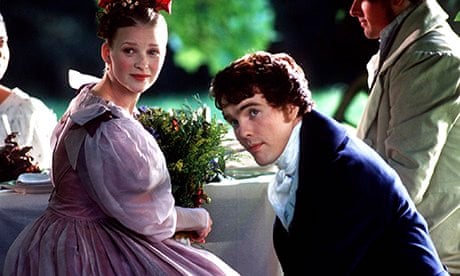“Blissful” is Dickens’s word to describe Copperfield’s tenderest memories of Dora Spenlow’s picnic birthday party. He’s about nineteen and obsessed, getting up before 6 AM to buy flowers, so they are fresh.
The picnic is near Guilford, Surrey, that David thinks might have been conjured by an “Arabian Night-magician.” He rides horseback behind Dora’s carriage to look at Dora, who sits in a seat looking back at him. He does not mind the dust.
The food and champagne are plentiful. They eat lobster, a salad of lettuces, made by Red Whiskers, another of Dora’s suitors. David is so jealous that he says, “Nothing should have induced ME to touch it!” David’s contribution is a store-bought basket of crackers and “mottoes,” something that I’ve not yet been able to identify. Champagne and tea are made “with the kettle boiling “gypsy-fashion” on an open fire.
Dora sings accompanied by the guitar, and the picnic ends, leaving David obsessively in love and hopeful of success.
“I was happier than ever when the party broke up, and the other people, defeated Red Whisker and all, went their several ways, and we went ours through the still evening and the dying light, with sweet scents rising up around us.”
Mr. Spenlow falls asleep on the return, and David brazenly rides alongside the open carriage. “I rode by the side and talked to Dora,” he writes, and “She admired my horse and patted him—oh, what a dear little hand it looked upon a horse!—and her shawl would not keep right, and now and then I drew it round her with my arm.”
See Charles Dickens The Personal History and Experience of David Copperfield the Younger. London: 1849-1850; Charles Dickens. The Personal History of David Copperfield / With A Portrait Of The Author and Sixty-One Illustrations By J. Barnard. (New York: Harper, 1872) ; The Personal History of David Copperfield. Works of Charles Dickens. Household Edition. Illustrated by Fredrick Barnard. London: Chapman and Hall, 1872. New York: Harper, 1872; Simon Curtis. David Copperfield (1999). Screenplay by Adrian Hodges is based on Charles Dickens’s novel (1850).
*Dora never lives up to David’s practical expectations as a wife. Conveniently, she dies of a lingering illness. Sad and chastened, David must get on in the world and find a proper lover and mate, which he does.
Ironically, while composing swaths of the novel, Dickens was vacationing on the Isle of Wight. Catherine Dickens was expecting their eighth child, eventually named Dora. It seemed a happy time, but Dickens was unhappy and disappointed with Catherine. He writes of this in David’s voice: “My mind was still running on some of the expressions used. ‘There can be no disparity in marriage like unsuitability of mind and purpose.’ ‘The first mistaken impulse of an undisciplined heart.’ ‘My love was founded on a rock.’ But we were at home; and the trodden leaves were lying under-foot, and the autumn wind was blowing.”

